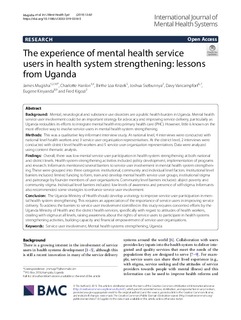| dc.contributor.author | Mugisha, James | |
| dc.contributor.author | Hanlon, Charlotte | |
| dc.contributor.author | Knizek, Birthe Loa | |
| dc.contributor.author | Ssebunnya, Joshua | |
| dc.contributor.author | Vancampfort, Davy | |
| dc.contributor.author | Kinyanda, Eugene | |
| dc.contributor.author | Kigozi, Fred | |
| dc.date.accessioned | 2019-09-25T14:03:06Z | |
| dc.date.available | 2019-09-25T14:03:06Z | |
| dc.date.created | 2019-09-25T10:25:01Z | |
| dc.date.issued | 2019 | |
| dc.identifier.citation | International Journal of Mental Health Systems. 2019, 13 (60), . | nb_NO |
| dc.identifier.issn | 1752-4458 | |
| dc.identifier.uri | http://hdl.handle.net/11250/2618797 | |
| dc.description.abstract | Background
Mental, neurological and substance use disorders are a public health burden in Uganda. Mental health service user involvement could be an important strategy for advocacy and improving service delivery, particularly as Uganda redoubles its efforts to integrate mental health into primary health care (PHC). However, little is known on the most effective way to involve service users in mental health system strengthening.
Methods
This was a qualitative key informant interview study. At national level, 4 interviews were conducted with national level health workers and 3 service user organization representatives. At the district level, 2 interviews were conducted with district level health workers and 5 service user organization representatives. Data were analyzed using content thematic analysis.
Findings
Overall, there was low mental service user participation in health system strengthening at both national and district levels. Health system strengthening activities included policy development, implementation of programs and research. Informants mentioned several barriers to service user involvement in mental health system strengthening. These were grouped into three categories: institutional, community and individual level factors. Institutional level barriers included: limited funding to form, train and develop mental health service user groups, institutional stigma and patronage by founder members of user organizations. Community level barriers included: abject poverty and community stigma. Individual level barriers included: low levels of awareness and presence of self-stigma. Informants also recommended some strategies to enhance service user involvement.
Conclusion
The Uganda Ministry of Health should develop a strategy to improve service user participation in mental health system strengthening. This requires an appreciation of the importance of service users in improving service delivery. To address the barriers to service user involvement identified in this study requires concerted efforts by the Uganda Ministry of Health and the district health services, specifically with regard to attitudes of health workers, dealing with stigma at all levels, raising awareness about the rights of service users to participate in health systems strengthening activities, building capacity and financial empowerment of service user organizations. | nb_NO |
| dc.language.iso | eng | nb_NO |
| dc.publisher | BMC (part of Springer Nature) | nb_NO |
| dc.rights | Navngivelse 4.0 Internasjonal | * |
| dc.rights.uri | http://creativecommons.org/licenses/by/4.0/deed.no | * |
| dc.title | The experience of mental health service users in health systems strengthening: lessons from Uganda | nb_NO |
| dc.type | Journal article | nb_NO |
| dc.type | Peer reviewed | nb_NO |
| dc.description.version | publishedVersion | nb_NO |
| dc.source.pagenumber | 11 | nb_NO |
| dc.source.volume | 13 | nb_NO |
| dc.source.journal | International Journal of Mental Health Systems | nb_NO |
| dc.source.issue | 60 | nb_NO |
| dc.identifier.doi | 10.1186/s13033-019-0316-5 | |
| dc.identifier.cristin | 1728705 | |
| dc.description.localcode | © The Author(s) 2019. This article is distributed under the terms of the Creative Commons Attribution 4.0 International License (http://creativecommons.org/licenses/by/4.0/) | nb_NO |
| cristin.unitcode | 194,65,35,0 | |
| cristin.unitname | Institutt for psykisk helse | |
| cristin.ispublished | true | |
| cristin.fulltext | original | |
| cristin.qualitycode | 1 | |

